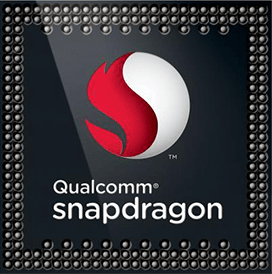
Qualcomm Snapdragon 750G Benchmark, Test and specs
Last updated:
The Qualcomm Snapdragon 750G has 8 cores with 8 threads and is based on the 3. gen of the Qualcomm Snapdragon series. The processor was released in Q4/2020. The Qualcomm Snapdragon 750G scores 644 points in the Geekbench 5 single-core benchmark. In the Geekbench 5 multi-core benchmark, the result is 1,922 points.

| Name: | Qualcomm Snapdragon 750G |
|---|---|
| Family: | Qualcomm Snapdragon (102) |
| CPU group: | Qualcomm Snapdragon 750 (1) |
| Architecture: | Kryo 570 |
| Segment: | Mobile |
| Generation: | 3 |
| Predecessor: | -- |
| Successor: | -- |
CPU Cores and Base Frequency
The Qualcomm Snapdragon 750G has 8 CPU cores and can calculate 8 threads in parallel. The clock frequency of the Qualcomm Snapdragon 750G is 2.20 GHz. The number of CPU cores greatly affects the speed of the processor and is an important performance indicator.
| CPU Cores / Threads: | 8 / 8 |
|---|---|
| Core architecture: | hybrid (big.LITTLE) |
| A-Core: | 2x Kryo 570 Gold |
| B-Core: | 6x Kryo 570 Silver |
| Hyperthreading / SMT: | No |
|---|---|
| Overclocking: | No |
| A-Core Frequency: | 2.20 GHz |
| B-Core Frequency: | 1.80 GHz |
Artificial Intelligence and Machine Learning
Processors with the support of artificial intelligence (AI) and machine learning (ML) can process many calculations, especially audio, image and video processing, much faster than classic processors. Algorithms for ML improve their performance the more data they have collected via software. ML tasks can be processed up to 10,000 times faster than with a classic processor.
| AI hardware: | Qualcomm AI engine |
|---|---|
| AI specifications: | Hexagon 692 @ 5 TOPS |
Internal Graphics
The Qualcomm Snapdragon 750G has integrated graphics, called iGPU for short. Specifically, the Qualcomm Snapdragon 750G uses the Qualcomm Adreno 619, which has 128 texture shaders and -- execution units. The iGPU uses the system's main memory as graphics memory and sits on the processor's die.
| GPU name: | Qualcomm Adreno 619 |
|---|---|
| GPU frequency: | 0.95 GHz |
| GPU (Turbo): | No turbo |
| Compute units: | -- |
| Shader: | 128 |
| Hardware Raytracing: | No |
| Release date: | Q2/2020 |
| Max. displays: | 2 |
|---|---|
| Generation: | 6 |
| Direct X: | 12.1 |
| Technology: | 8 nm |
| Max. GPU Memory: | 4 GB |
| Frame Generation: | No |
Hardware codec support
A photo or video codec that is accelerated in hardware can greatly accelerate the working speed of a processor and extend the battery life of notebooks or smartphones when playing videos.
| h265 / HEVC (8 bit): | Decode |
|---|---|
| h265 / HEVC (10 bit): | Decode |
| h264: | Decode / Encode |
| VP8: | Decode |
| VP9: | Decode |
| AV1: | No |
|---|---|
| AVC: | Decode |
| VC-1: | Decode |
| JPEG: | Decode / Encode |
Memory & PCIeThe processor can use up to 12 GB memory in 2 (Dual Channel) memory channels. The maximum memory bandwidth is 17.1 GB/s. The memory type as well as the amount of memory can greatly affect the speed of the system. |
|
| Memory type: | Memory bandwidth: |
|---|---|
| LPDDR4X-4266 | 17.1 GB/s |
| Max. Memory: | 12 GB |
| Memory channels: | 2 (Dual Channel) |
| ECC: | No |
| PCIe: | |
| PCIe Bandwidth: | -- |
Thermal ManagementThe thermal design power (TDP for short) of the processor is . The TDP specifies the necessary cooling solution that is required to cool the processor sufficiently. The TDP usually gives a rough idea of the actual power consumption of the CPU. |
|
|---|---|
| TDP (PL1 / PBP): | |
| TDP (PL2): | -- |
| TDP up: | -- |
| TDP down: | -- |
| Tjunction max.: | -- |
Technical details
The Qualcomm Snapdragon 750G is made in 8 nm. The smaller the manufacturing process of a CPU, the more modern and energy-efficient it is. Overall, the processor has 0.00 MB cache. A large cache can greatly speed up the processor's speed in some cases such as games.
| Technology: | 8 nm |
|---|---|
| Chip design: | Chiplet |
| Socket: | -- |
| L2-Cache: | -- |
| L3-Cache: | -- |
| AES-NI: | No |
| Operating systems: | Android |
| Virtualization: | None |
|---|---|
| Instruction set (ISA): | Armv8-A (64 bit) |
| ISA extensions: | -- |
| Release date: | Q4/2020 |
| Release price: | 500 $ |
| Part Number: | SM7225 |
| Documents: | Technical data sheet |
Rate this processor
Benchmark results

The benchmark results for the Qualcomm Snapdragon 750G have been carefully checked by us. We only publish benchmark results that have been created by us or that have been submitted by a visitor and then checked by a team member. All results are based on and fullfill our benchmark guidelines.
Geekbench 5, 64bit (Single-Core)
Geekbench 5 is a cross plattform benchmark that heavily uses the systems memory. A fast memory will push the result a lot. The single-core test only uses one CPU core, the amount of cores or hyperthreading ability doesn't count.

|
MediaTek Dimensity 820
8C 8T @ 2.60 GHz |
||

|
Intel Core i5-3210M
2C 4T @ 3.10 GHz |
||

|
Samsung Exynos 880
8C 8T @ 2.00 GHz |
||
|
|
Qualcomm Snapdragon 750G
8C 8T @ 2.20 GHz |
||

|
Intel Core i7-3537U
2C 4T @ 3.10 GHz |
||

|
Intel Core m5-6Y57
2C 4T @ 2.80 GHz |
||
|
|
HiSilicon Kirin 820 5G
8C 8T @ 2.36 GHz |
||
Geekbench 5, 64bit (Multi-Core)
Geekbench 5 is a cross plattform benchmark that heavily uses the systems memory. A fast memory will push the result a lot. The multi-core test involves all CPU cores and taks a big advantage of hyperthreading.

|
Intel Core i3-7100T
2C 4T @ 3.40 GHz |
||

|
Intel Core i3-4170
2C 4T @ 3.70 GHz |
||

|
Qualcomm Snapdragon 695 5G
8C 8T @ 2.20 GHz |
||
|
|
Qualcomm Snapdragon 750G
8C 8T @ 2.20 GHz |
||

|
Intel Core i7-7600U
2C 4T @ 3.90 GHz |
||

|
AMD FX-6300
6C 6T @ 4.10 GHz |
||

|
Samsung Exynos 9810
8C 8T @ 2.90 GHz |
||
Geekbench 6 (Single-Core)
Geekbench 6 is a benchmark for modern computers, notebooks and smartphones. What is new is an optimized utilization of newer CPU architectures, e.g. based on the big.LITTLE concept and combining CPU cores of different sizes. The single-core benchmark only evaluates the performance of the fastest CPU core, the number of CPU cores in a processor is irrelevant here.

|
MediaTek Dimensity 820
8C 8T @ 2.60 GHz |
||

|
Intel Core i5-4300U
2C 4T @ 2.90 GHz |
||

|
Intel Xeon E5-2667 v2
8C 16T @ 4.00 GHz |
||
|
|
Qualcomm Snapdragon 750G
8C 8T @ 2.20 GHz |
||

|
Samsung Exynos 9820
8C 8T @ 2.70 GHz |
||

|
Samsung Exynos 1330
8C 8T @ 2.40 GHz |
||

|
Intel Pentium Gold G5420
2C 4T @ 3.80 GHz |
||
Geekbench 6 (Multi-Core)
Geekbench 6 is a benchmark for modern computers, notebooks and smartphones. What is new is an optimized utilization of newer CPU architectures, e.g. based on the big.LITTLE concept and combining CPU cores of different sizes. The multi-core benchmark evaluates the performance of all of the processor's CPU cores. Virtual thread improvements such as AMD SMT or Intel's Hyper-Threading have a positive impact on the benchmark result.

|
Intel Core i7-2760QM
4C 8T @ 2.40 GHz |
||

|
Intel Core i5-4278U
2C 4T @ 2.60 GHz |
||

|
Intel Core i5-6200U
2C 4T @ 2.70 GHz |
||
|
|
Qualcomm Snapdragon 750G
8C 8T @ 2.20 GHz |
||

|
Intel Pentium Gold G6500
2C 4T @ 4.10 GHz |
||

|
Intel Pentium Gold G5600F
2C 4T @ 3.90 GHz |
||

|
Intel Pentium Gold G5600
2C 4T @ 3.90 GHz |
||
iGPU - FP32 Performance (Single-precision GFLOPS)
The theoretical computing performance of the internal graphics unit of the processor with simple accuracy (32 bit) in GFLOPS. GFLOPS indicates how many billion floating point operations the iGPU can perform per second.

|
Intel Core i3-12100
Intel UHD Graphics 730 @ 1.40 GHz |
||

|
Intel Core i3-12100E
Intel UHD Graphics 730 @ 1.40 GHz |
||

|
Intel Core i3-12100T
Intel UHD Graphics 730 @ 1.40 GHz |
||
|
|
Qualcomm Snapdragon 750G
Qualcomm Adreno 619 @ 0.95 GHz |
||

|
Qualcomm Snapdragon 480 Plus 5G
Qualcomm Adreno 619 @ 0.95 GHz |
||

|
Qualcomm Snapdragon 480 5G
Qualcomm Adreno 619 @ 0.95 GHz |
||

|
AMD A8-7650K
AMD Radeon R7 - 384 (Kaveri) @ 0.72 GHz |
||
AnTuTu 9 Benchmark
The AnTuTu 9 benchmark is very well suited to measuring the performance of a smartphone. AnTuTu 9 is quite heavy on 3D graphics and can now also use the "Metal" graphics interface. In AnTuTu, memory and UX (user experience) are also tested by simulating browser and app usage. AnTuTu version 9 can compare any ARM CPU running on Android or iOS. Devices may not be directly comparable when benchmarked on different operating systems.
In the AnTuTu 9 benchmark, the single-core performance of a processor is only slightly weighted. The rating is made up of the multi-core performance of the processor, the speed of the working memory, and the performance of the internal graphics.
In the AnTuTu 9 benchmark, the single-core performance of a processor is only slightly weighted. The rating is made up of the multi-core performance of the processor, the speed of the working memory, and the performance of the internal graphics.

|
MediaTek Dimensity 900
8C 8T @ 2.40 GHz |
||

|
UNISOC T770
8C 8T @ 2.50 GHz |
||

|
Samsung Exynos 1280
8C 8T @ 2.40 GHz |
||
|
|
Qualcomm Snapdragon 750G
8C 8T @ 2.20 GHz |
||

|
MediaTek Helio G99
8C 8T @ 2.20 GHz |
||

|
MediaTek Dimensity 800U
8C 8T @ 2.40 GHz |
||

|
Qualcomm Snapdragon 765G
8C 8T @ 2.40 GHz |
||
AnTuTu 8 Benchmark
The AnTuTu 8 Benchmark measures the performance of a SoC. AnTuTu benchmarks the CPU, GPU, Memory as well as the UX (User Experience) by simulating browser and app usage. AnTuTu can benchmark any ARM CPU that runs under Android or iOS. Devices may not be directly compareable if the benchmark has been performed under different operating systems.
In the AnTuTu 8 benchmark, the single-core performance of a processor is only slightly weighted. The evaluation consists of the multi-core performance of the processor, the speed of the RAM and the performance of the internal graphics.
In the AnTuTu 8 benchmark, the single-core performance of a processor is only slightly weighted. The evaluation consists of the multi-core performance of the processor, the speed of the RAM and the performance of the internal graphics.

|
Qualcomm Snapdragon 768G
8C 8T @ 2.80 GHz |
||
|
|
HiSilicon Kirin 820E 5G
8C 8T @ 2.22 GHz |
||

|
MediaTek Dimensity 800U
8C 8T @ 2.40 GHz |
||
|
|
Qualcomm Snapdragon 750G
8C 8T @ 2.20 GHz |
||

|
Samsung Exynos 980
8C 8T @ 2.20 GHz |
||

|
MediaTek Dimensity 700
8C 8T @ 2.20 GHz |
||

|
Qualcomm Snapdragon 765G
8C 8T @ 2.40 GHz |
||
Estimated results for PassMark CPU Mark
Some of the CPUs listed below have been benchmarked by CPU-monkey. However the majority of CPUs have not been tested and the results have been estimated by a CPU-monkey’s secret proprietary formula. As such they do not accurately reflect the actual Passmark CPU mark values and are not endorsed by PassMark Software Pty Ltd.

|
Intel Core i3-7300
2C 4T @ 4.00 GHz |
||

|
Qualcomm Snapdragon 7c Gen 2
8C 8T @ 2.55 GHz |
||

|
Intel Core i5-4460S
4C 4T @ 3.10 GHz |
||
|
|
Qualcomm Snapdragon 750G
8C 8T @ 2.20 GHz |
||

|
AMD Athlon 240GE
2C 4T @ 3.50 GHz |
||

|
Qualcomm Snapdragon 855
8C 8T @ 2.84 GHz |
||

|
Intel Core i5-3550S
4C 4T @ 3.00 GHz |
||
Performance for Artificial Intelligence (AI) and Machine Learning (ML)
Processors with the support of artificial intelligence (AI) and machine learning (ML) can process many calculations, especially audio, image and video processing, much faster than classic processors. The performance is given in the number (trillions) of arithmetic operations per second (TOPS).

|
Qualcomm Snapdragon 765
8C 8T @ 2.30 GHz |
||

|
Qualcomm Snapdragon 765G
8C 8T @ 2.40 GHz |
||

|
Qualcomm Snapdragon 768G
8C 8T @ 2.80 GHz |
||
|
|
Qualcomm Snapdragon 750G
8C 8T @ 2.20 GHz |
||

|
Qualcomm Snapdragon 7c Gen 2
8C 8T @ 2.55 GHz |
||

|
Qualcomm Snapdragon 7c
8C 8T @ 2.40 GHz |
||

|
Qualcomm Snapdragon 720G
8C 8T @ 2.30 GHz |
||
Benchmarks

Geekbench 5 (SC)
2,488 entries
2,488 entries

Geekbench 5 (MC)
2,461 entries
2,461 entries

Geekbench 6 (SC)
1,754 entries
1,754 entries

Geekbench 6 (MC)
1,702 entries
1,702 entries

FP32 SP (iGPU)
2,026 entries
2,026 entries

AnTuTu 9 Benchmark
90 entries
90 entries

AnTuTu 8 Benchmark
118 entries
118 entries

PassMark CPU-Mark
2,391 entries
2,391 entries

AI / ML Performance
116 entries
116 entries
Description of the processor
The Qualcomm Snapdragon 750G is a smartphone processor based on the 3rd generation of the Qualcomm Snapdragon series. The processor had a release price of $500 and was released in Q4 2020 with item number SM7225.The processor has 8 CPU cores with 8 threads. The processor architecture is hybrid, which means it is based on the big.LITTLE concept. The A-Core is based on the Kryo 570 Gold architecture and the B-Core is based on the Kryo 570 Silver architecture. The processor does not use Hyperthreading and cannot be overclocked. The A core clock frequency is 2.20 GHz and the B core clock frequency is 1.80 GHz.
The processor also comes with integrated graphics, which is why the processor is also called APU (Accelerated Processing Unit). Based on a Qualcomm Adreno 619, the graphics clock frequency for the APU is 0.95 GHz, but has no turbo and the APU contains 128 shaders in total. The maximum memory is 4 GB and DirectX 12.1 is supported.
The memory type of the processor is called LPDDR4X-2133, the memory itself has a maximum of 8 GB and contains 2 memory channels. The chip design is based on chiplet using the Kryo570 architecture and runs on the Android operating system.
In the Geekbench 5 test (64bit, single core), the Qualcomm Snapdragon 750G received a total of 644 points. The processor is below the Samsung Exynos 880 on this score, however it gets the same score as the Intel Core i7-3520M but better than the Intel Core i7-5500U.
In Geekbench 5 (64bit, multi-core), the processor gets a score of 1,940 and is thus below the successor Qualcomm Snapdragon 850, but above the Intel Core i3-8121U. The processor scored 398,403 points in the AnTuTu 9 benchmark test and 333,611 points in the AnTuTu 8 benchmark test.
Popular comparisons
back to index





